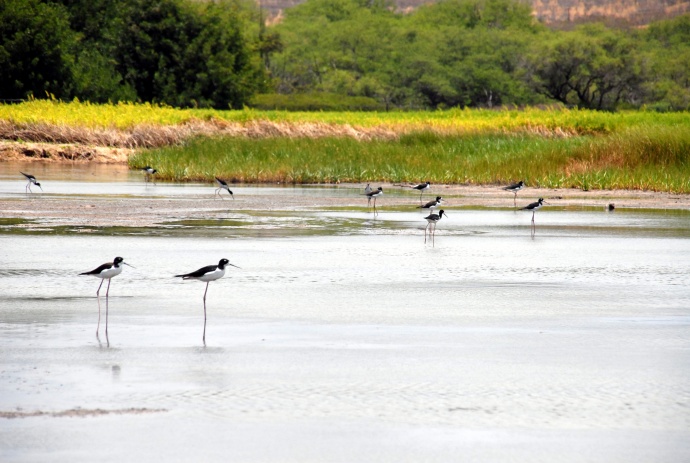BREAKING: Avian Botulism Being Monitored on Maui
By Wendy Osher
State biologists are monitoring wetlands after being notified of a recent outbreak of avian botulism affecting waterbirds on Maui.
The Department of Land and Natural Resources’ Division of Forestry and Wildlife reported the outbreak saying that in just over a week, 67 birds have been found dead at Kanaha Pond Wildlife Sanctuary in Kahului.
Affected birds include: the Hawaiian Stilt, Hawaiian Coot, and Hawaiian Ducks of adult and juvenile stages. State officials with the DLNR division say the paralytic disease has killed adult birds on their nests, also causing the eggs to be lost.
Because botulinum toxin can be produced in most wetlands, and transported to new wetlands by dead or dying waterfowl, landowners and managers, both public and private, are being asked to frequently survey their wetlands.
State officials say landowners and managers should be on the lookout for sick and/or dead birds, remove any dead or dying birds from the wetland, and contact local DOFAW biologists for assistance.
An outbreak of botulism was reported earlier this year in Hanalei, Kaua’i. According to state authorities, that outbreak resulted in over 300 sick and dead birds being collected by USFWS refuge staff.
Additionally, state DLNR officials say numerous other botulism fatalities have also been reported at wetlands throughout Hawai’i.
What is Botulism:
Botulism is a paralytic condition brought on by the consumption of a naturally occurring toxin produced by the bacterium Clostridium botulinum. It is an intoxication rather than an infectious disease, state officials said.
Botulism, type C is commonly found in Hawaiian soils and is not considered dangerous to humans.
Environmental conditions in wetlands can allow this bacterium to produce botulinum toxin; the toxin is then accumulated in aquatic invertebrates. It is consumption of these toxic invertebrates by waterfowl, officials say, that leads to mortality.
In Hawai‘i, birds commonly affected include waterfowl frequenting wetlands such: the endangered Hawaiian coots, Hawaiian ducks, Laysan ducks, Hawaiian moorhen, Hawaiian stilts, Black-crowned night- herons, and various migratory waterfowl and shorebirds.
“Part of our role is to determine the cause of death during unusual wildlife mortality events involving native and endangered species and provide management recommendations to address and mitigate such mortalities” said Dr. Thierry Work, Wildlife Disease Specialist for the USGS National Wildlife Health Center Honolulu Field Station in a statement today.
“For this particular event, our team first conducts necropsies of freshly dead birds here in Honolulu and then sends samples to the National Wildlife Health Center in Madison Wisconsin for confirmation of botulism.”
What the public can do:
The public is asked to report deaths of waterbirds to the District DOFAW Office on respective islands. On private lands individuals are asked to take the above mentioned recommended wetland management actions to prevent further impacts.
- DOFAW Administration Office: 1151 Punchbowl Street, Room 325, Honolulu, Hawai‘i 96813; (808) 587-0166; fax (808) 587-0160.
- Kaua‘i Branch: 3060 ‘Eiwa Street , Room 306, Lihu‘e , Hawai‘i 96766 ; phone (808) 274-3433; fax (808) 274-3438.
- O‘ahu Branch: 2135 Makiki Heights Drive , Honolulu , Hawai‘i 96822 ; phone (808) 973-9778; fax (808) 973-9781.
- Maui Branch (including Moloka‘i, Lana‘i, and Kaho‘olawe): 54 South High Street , Room 101, Wailuku , Hawai‘i 96793; phone (808) 984-8100; fax (808) 984-8111.
- Hawai‘i Branch : (Hilo Office)19 East Kawili Street , Hilo , Hawaii 96720 ; phone (808) 974-4221; fax (808) 974-4226 ; (Waimea Office) 66-1220A Laiamilo Road, Kamuela Hawai‘i 96743; phone (808) 887-6061; fax (808) 887-6065
- USGS – National Wildlife Health Center, Honolulu Field Station: Tel. 808 792-9520, 808.792.9521 or 808.792.9523











